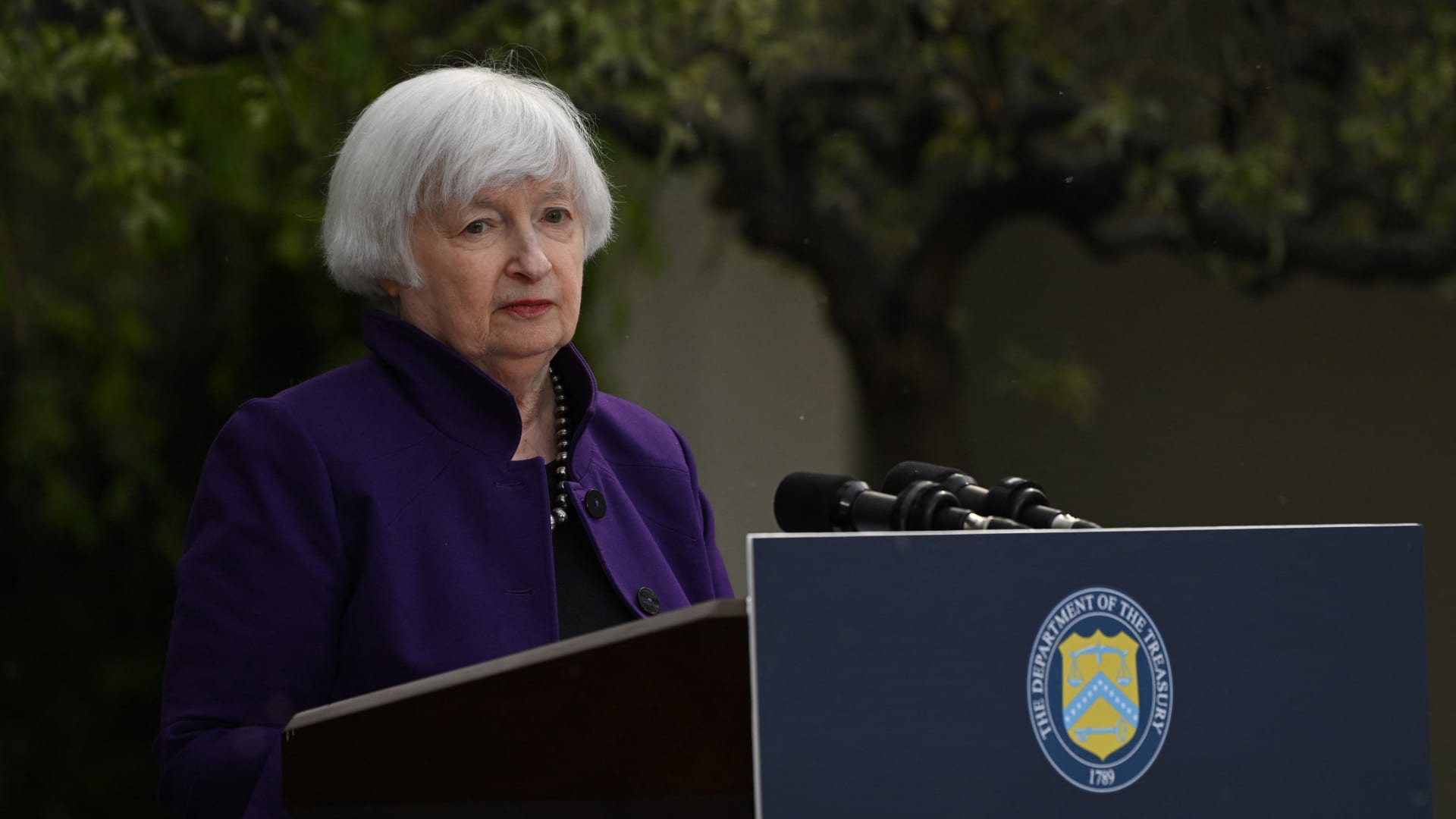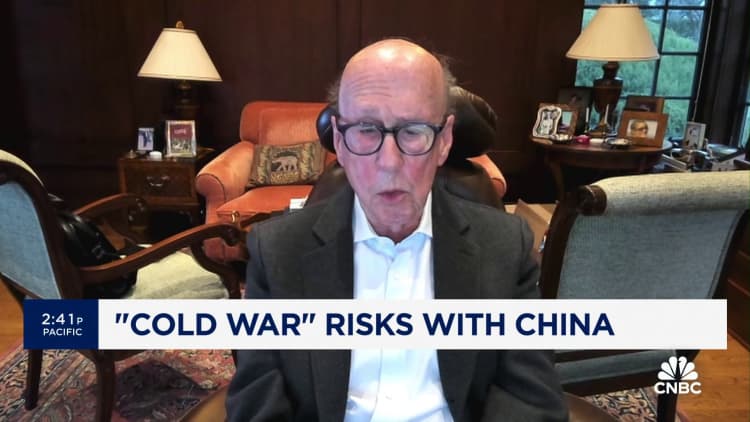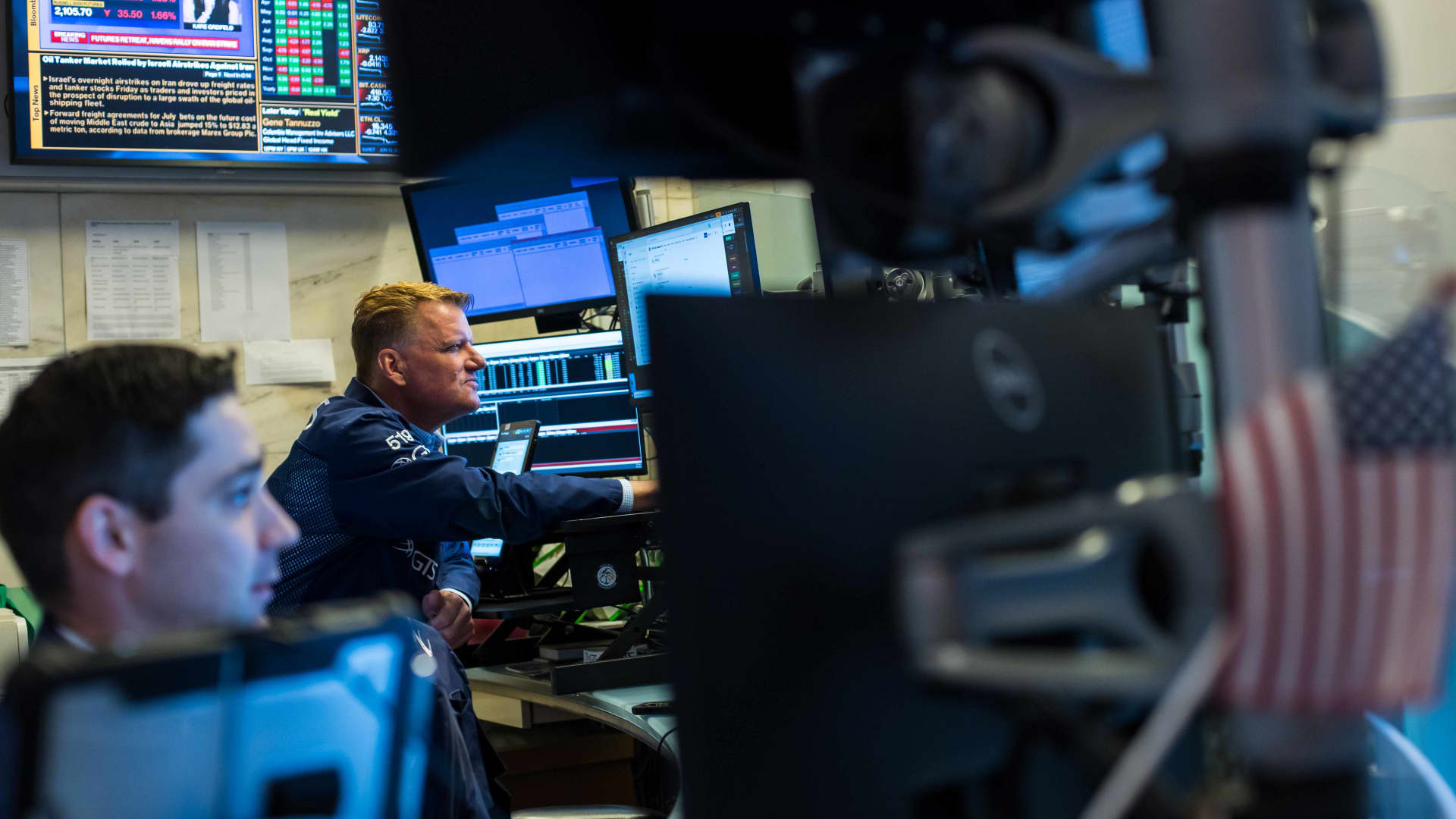Customers look at clothes advertising discounts of 80% or 70% in a supermarket in Hangzhou, Zhejiang province, China, on June 9, 2025.
Cfoto | Future Publishing | Getty Images
BEIJING — China’s consumer spending shows little sign of picking up soon, given uncertainty about future wealth, changing preferences and lack of a social safety net.
It’s been four straight months of declining consumer prices, consumer confidence is hovering near historic lows, and the real estate market is struggling to turn around. Analysts repeatedly point to one main factor: stagnant income.
Disposable income in China has halved its pace of growth since the pandemic hit in 2020, now growing only by an average of 5% a year, Jeremy Stevens, Beijing-based Asia economist at Standard Bank, said in a report Wednesday.
Most jobs aren’t giving much of a raise. Out of 16 sectors, only three — mining, utilities and information technology services — have seen wage growth exceed that of gross domestic product since 2020, he said.
Monthly business surveys for May showed contraction in the labor market across the board, especially as factories navigate U.S. tariffs. The unemployment rate among young people aged 16 to 24 and not in school remained high in April at 15.8%. The official jobless rate in cities has hovered around 5%.
A record high of 64% Chinese households said in the third quarter of 2024 that they would rather save money rather than spend or invest it, according to a quarterly survey by the People’s Bank of China.
While that moderated to 61.4% in the fourth quarter, according to the latest survey released in March, it reflected a trend of more than 60% of respondents preferring to save that’s been recorded since late 2023.
And for the respondents who planned to increase spending, education was the top category, followed by health care and tourism, according to the PBOC’s fourth-quarter survey released in March.
More than half of respondents viewed the job market as becoming more difficult or hard to tell.
People in China have been culturally inclined to save, especially since limited insurance coverage means individuals must often bear most of the cost of a hospital treatment, higher education and retirement. The real estate slump of the last few years has also weighed on spending since property accounts for most of household wealth in China.
One way to make people more willing to spend is to more than double pension payouts, by increasing the share of state assets paid to the Ministry of Finance, Luo Zhiheng, chief economist at Yuekai Securities, said in a note.
He added that increasing public holidays and offering services sector consumption vouchers could also help.
In the last few weeks, Chinese authorities have stepped up plans to further support employment and improve social welfare. But policymakers have avoided the mass cash handouts that the U.S. and Hong Kong gave residents to stimulate spending after the pandemic.
Coming out of the pandemic, analysts cautioned that retail sales in China would recover very slowly as major uncertainties for consumers remained unresolved.
In the decade before the pandemic, “Chinese consumers were willing and able to buy any innovation, even innovations that were not that really innovations,” said Bruno Lannes, Shanghai-based senior partner with Bain & Company’s consumer products and retail practices.
“In today’s world they are more rational. They know what they want,” he said on a webinar Thursday.
China is scheduled to report retail sales for May on Monday. Analysts polled by Reuters predict a slowdown to 4.9% year-on-year growth, down from 5.1% in April.
A shift out of big cities
Another factor behind negative CPI reads is that Chinese consumers are turning to lower-priced products, either partly benefiting from the overproduction of relatively high-quality goods, or moving away from big cities to places where the cost of living is lower.
Shanghai lost 72,000 permanent residents last year, while Beijing saw a 26,000 drop, Worldpanel and Bain & Company pointed out in a report Thursday. The two cities are typically categorized as “tier 1” cities in China.
As a result of the population shift, smaller cities categorized as “tier 3” and “tier 4” experienced far higher growth in the volume and value of daily necessities sold last year — helping offset a decline in the tier 1 cities, the report said. The study covered packaged food, beverages, personal care and home care.
It found that while the overall volume of such goods sold in China rose by 4.4% last year, average selling prices fell by 3.4%, as consumers preferred lower-priced products and businesses increased promotions.
The trend is even influencing flower sales.
The Kunming International Flora Auction Trading Center in Yunnan province, Asia’s largest flower market, said in May that more demand is coming from less affluent lower-tier cities, resulting in higher volumes but lower average selling prices.
Business has quieted down after the busy May holiday season, Li Shenghuan, a flower seller near the trading center, said Friday. She said flower prices have come down slightly, partly because more people have been growing flowers. She expects demand to pick up around the National Day holiday in early October.
For a sense of the disparity, rural per capita disposable income has been less than half that of cities for years, according to official data. Per capita disposable income in urban areas last year was 54,188 yuan ($7,553). That’s far less than the $64,474 reported for the U.S. as of December.
Weekly analysis and insights from Asia’s largest economy in your inbox
Subscribe now
Standard Bank’s Stevens pointed out that the ratio of consumption to income in rural areas has “substantially increased” and surpassed pre-pandemic levels, while that of urban households has declined. But he noted that lower-income households don’t have the scale of wealth that higher-income groups do in order to meaningfully increase consumption in the near term.
The top 20% accounts for half of total income and consumption in China, and 60% of total savings, he said. “Policy support for low-income groups, while well-meaning, is insufficient without structural wage reform.”
In addition, China’s “common prosperity” rhetoric “has introduced institutional realignments and policy shifts that, while well-intentioned, have added to the uncertainty,” Stevens said, noting the changes have “yet to fully find a new equilibrium.”

 Economics1 week ago
Economics1 week ago
 Economics1 week ago
Economics1 week ago
 Economics1 week ago
Economics1 week ago
 Finance1 week ago
Finance1 week ago
 Blog Post1 week ago
Blog Post1 week ago
 Economics1 week ago
Economics1 week ago
 Personal Finance1 week ago
Personal Finance1 week ago
 Economics1 week ago
Economics1 week ago














